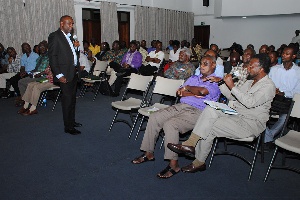 Mr. Mohammed Lawal Rufai in a dialogue with Ing Kwame Boakye, President of GhIE
Mr. Mohammed Lawal Rufai in a dialogue with Ing Kwame Boakye, President of GhIE
MTN, Ghana’s leading telecommunications service provider, has engaged the Ghana Institution of Engineers in a program dubbed “Engineers Time with MTN.”
“Engineers Time with MTN” is a thought leadership engagement organized by the Ghana Institution of Engineers to understand MTN’s position on vital issues related to the Institution and also to deepen members’ understanding of MTN Ghana’s operations. The engagement session was also aimed at promoting MTN’s innovations in the telecommunication industry.
The programme, which was attended by a large section of the engineering community and the leadership of the Institution, highlighted best practices and some of the challenges being faced by the network operator in technical areas.
During the engagement, the Chief Technical Officer (CTO) of MTN, Mohammed Rufai, called on the engineering community to help stop the incessant cutting of fibre optic cables that disrupt the operations of telecommunications companies in Ghana.
The CTO explained that MTN Ghana’s traffic is driven by an extensive nationwide network of underground fibre optic cables. Careless and accidental disruption of the fibre optic network has critical impact on the smooth flow of traffic on the network. As MTN Ghana optimizes its services, it is imperative that its fibre optic cables laid across the country remain intact.
During the interaction, Mohammed Rufai indicated that the consistent cutting of fibre optic cables, mostly by construction workers, is the biggest problem affecting the quality of services provided by MTN. About 88% of fibre cuts, he said, are due to construction activities, and in addition to compromising quality of service experienced by subscribers, this menace leads to loss of revenue.
“We used to have 100 fibre cuts a month; there was a time the number rose to 132 cuts a month. At a point it went down a bit but it’s unfortunate that in December 2016 88% of fiber cuts were due to increase in construction activities,” he stated.
“We really need the help of all stakeholders, including the engineering community because this impacts customer experience,” he added. “The issue of fibre cuts remains the biggest contributor to poor service quality.” Fibre optic cables, he said, are usually buried 1.2 meters deep, ducted and preceded with warning tape. When one fibre optic cable is cut, connected communities are unable to make calls or access internet services. The effect is even worse when the cut occurs at the backbone of the layout.
He urged the public to elevate the premium placed on protecting telecommunications fibre as it goes a long way to ensure the provision of reliable uninterrupted network service.
The president of the Ghana Institution of Engineers, Ing Dr. Kwame Boakye, speaking on behalf of the Institution, committed to step in and provide the necessary guidance that would help resolve the issue of wanton fibre cuts.
“Let’s put this at the feet of our National Engineering Advisory and Review Group so that they can take a better look, understand what the options are and make some informed decisions,” he said.